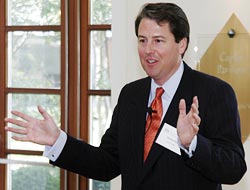"Nebulous" Antitrust Law Can Lead to Controversy, Says Pate '87

Antitrust remains an ill-defined area of law, and whether consumer or economic welfare should be its underlying concern is still in question, said R. Hewitt Pate '87, former Assistant Attorney General to the U.S. Justice Department, who delivered a brief tour of contemporary antitrust laws and practices to the Alumni Business Advisory Council Sept. 23.
Pate, now a partner with Hunton & Williams, opened his talk with a nod to former Supreme Court Justice Lewis F. Powell Jr., whom he considers to be "the author of the key modern decisions in American antitrust law." Powell's influential court decisions stressed the importance of economic principles in antitrust law and suggested government intervention only when "efficiency would be enhanced." According to a speech Powell delivered at a 1967 conference of financial executives, antitrust laws were considered "a trap for the unwary and naïve" in business circles; he considered antitrust to be a "nebulous" area of law.
These ideas influenced Pate's own practice of antitrust law. During his recent tenure under the Bush administration at the Justice Department's Antitrust Division, he pursued "objective, transparent standards of antitrust liability" in cases involving unilateral conduct by businesses. As he told the audience, "I'm sad to tell you that this statement of Justice Powell's remains as true today as it was in 1967: that these areas remain very controversial and uncertain."
The key characteristic of the Justice Department's Antitrust Division, according to Pate, is its ability to enforce criminal negligence of antitrust law. As Assistant Attorney General, Pate reported directly to the Attorney General. Though a part of the executive branch, Pate stressed that the department is "very insulated from politics. Folks are very concerned about not having politics intrude into transactions where so much money is at stake," he said. "The risk of that is obvious."
Pate's question to the audience was whether any general consensus can be achieved regarding current antitrust law despite interference in the economy. "Rather than thinking antitrust laws are about independence of businesspeople or protecting small business, in theory it's about protecting competition in a way that enhances economic welfare," he said. There still remains no answer to the question of whether overall economic welfare or consumer welfare should be the underlying concern of antitrust law.
Cartel enforcement, "the clearest area of antitrust enforcement," is a top priority of the Justice Department's Antitrust Division. Their approach to dealing with cartels is different from approaches toward other white-collar crimes. "In order to make a cartel, it takes multiple actors and what happens now under the U.S. approach is that there's an amnesty program," he said. "If you expose [the cartel], you get complete freedom from any criminal liability. If you're the person who comes and rats everybody else out, then you're liable only for single damages on your own conduct and you avoid what is now a potential 10 years of imprisonment."
A more problematic and controversial area of antitrust law, however, involves the issue of unilateral conduct. "When do we tell firms that have gotten big that they're just competing in too rough a manner, or in a manner that doesn't leave room for smaller competitors?" he asked. Pate cited U.S. v. Microsoft as a recent example of this issue.
In the arena of unilateral conduct, there is a gulf of differences between American and European views towards monopolies. Large European firms "incur the obligation to compete like a gentleman," said Pate. The European view stresses tough rules, but little to no private litigation.
The opposite holds true for the American view: frequent litigation with somewhat weaker rules. Verizon v. Trinko best summarizes the American view towards monopolies. In the case, AT&T customer Curt Trinko complained that Verizon, whose phone lines AT&T was paying a fee to use under the anti-monopoly 1996 Telecommunications Act, discriminated against AT&T customers by providing poorer service. The Supreme Court ruled that the United States "is not opposed to the status of monopoly; it's what gets businesses out of bed in the morning to compete hard." The focus instead lies in issues of misconduct. Pate fears that combining European-style substantive rules with American-style litigation could be very dangerous to competition law. "If you put the two together, you can clog up the economy pretty thoroughly," said Pate.
On the international level, cultural difference plays an important role in antitrust and competition law, Pate said. "There are questions [as to whether] a more American style of competition is wanted," he said. "And they are legitimate debates, but I think for my money they ought to be open political debates. It really doesn't do very well to inject your view about agricultural policy or the number of different cheeses you should have into competition law. If competition law is going to have any real value, it needs to stick to the economics."
Recent years have seen a huge growth in the global proliferation of antitrust law. "Now there are upwards of 90 antitrust agencies around the world and they are going to start being more and more active," he said. China, which has plans to install antitrust laws by 2007, will be an important focal point in the future of antitrust law.
"They're moving along very quickly on this," he said. "It's a real open question where this goes."
Founded in 1819, the University of Virginia School of Law is the second-oldest continuously operating law school in the nation. Consistently ranked among the top law schools, Virginia is a world-renowned training ground for distinguished lawyers and public servants, instilling in them a commitment to leadership, integrity and community service.


